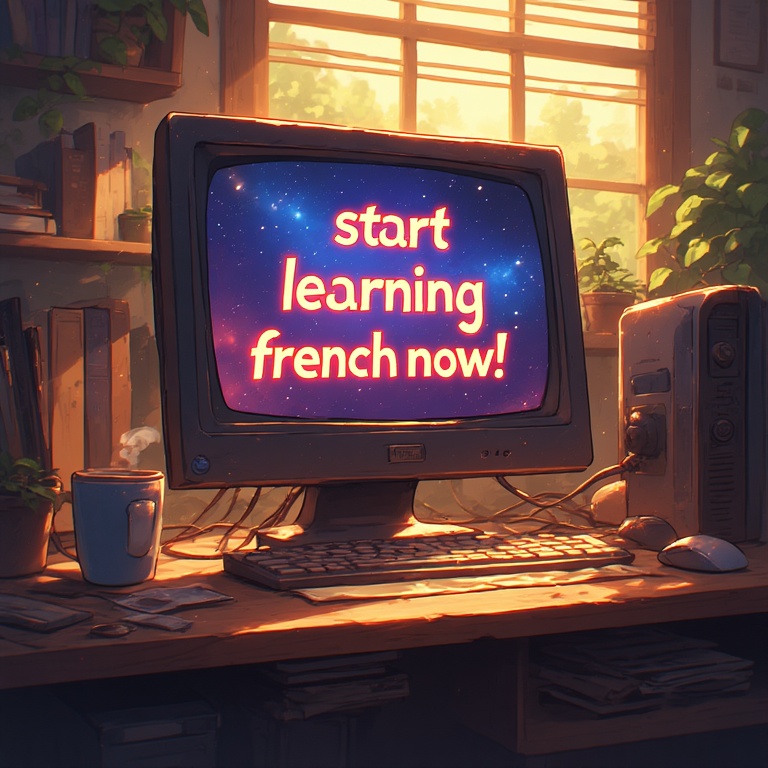
Learning French can be a difficult task if you don’t know where to start or what learning materials to use. In this article, you will find my list of the best resources for learning French for beginners (A1).
Table des matières
Books
1.
I advise you to get the vocabulary book Les mille premiers mots. It is a vocabulary book featuring everyday situations in pictures. There are illustrations of all the vocabulary words around the boards of each page.
Interesting aspects of this book
- The images are easy to understand and the scenarios are clear
- The audio for each page is available at this link (just choose the vocabulary page you want to study)
- The site has a very useful interactive vocabulary base
List of vocabulary themes
Below is the list of chapters in the book. Any reproduction, even partial, of the book is prohibited so I cannot show you an extract. However, a French mom wrote an article which shows some illustrations at this address.
| La maison La cuisine Le jardin L’atelier La rue Le magasin de jouets Le jardin public Les animaux Le voyage La campagne La ferme La plage L’école L’hôpital Le docteur La fête Le magasin | La nourriture Moi Les vêtements Les gens Les actions Les contraires Les jours Le temps Les saisons Les animaux familiers Les sports Les couleurs Les formes Les nombres La fête foraine Le cirque |
Online Resources for Learning French for Beginners (A1)

There are many online resources that can help you learn French. Here is my list of the best resources for learning French for beginners (A1) for free online:
Pronunciation
💠 To help you with pronunciation, there is the website YouGlish. This tool allows you to search for words or phrases spoken by native speakers. You can even choose the country of origin, namely, France, Belgium, or Canada. Once you’ve typed your word or phrase, YouGlish will search for all videos containing that word and submit its playlist to you. Under each video, you also have the subtitles with the spoken word highlighted. This tool is therefore very useful for pronunciation or to search for videos on specific topics:
💠 I also invite you to watch the humorous videos of Loic Suberville. They are very funny and will teach you some vocabulary words in French or show you certain cultural differences:
Meaning of Words
As a dictionary, I can only recommend Collins. This dictionary offers you the audio version as well as example sentences containing the word you have searched. It also offers the conjugation of verbs (note that the conjugation is incomplete in this dictionary, see the next paragraph for a better conjugator), the use of the word over time, and a translation in many languages that are not yet available on the Collins dictionary (like Japanese, Korean, Arabic, Polish, etc.). Here is an example with the verb « enseigner » (“to teach”):
Conjugation
For conjugation, I recommend L’Obs la conjugaison. This conjugator has a database of over 9000 verbs. Most importantly, the verbs are conjugated in all the tenses you need to speak (1) and a definition (2), synonyms (3) and conjugation exercises (4) are provided for each tense.
The News
🟡 To follow the news in French, I recommend the site 1jour1actu. This site provides daily news information in the form of articles, podcasts, and short videos. This site is made for French children (the starting age is 8), so the explanations are greatly simplified. Spending ten minutes a day reading French news and writing down five words or expressions that you think are useful will make a big difference.
🟡 You can also listen to the radio or podcasts. Rfi radio is very popular among students. This radio presents international news and publishes short and simplified articles.
🟡 One of the last best audiovisual resources for learning French for beginners (A1) is the French-speaking television channel TV5 Monde. You will find videos and articles in simplified French.
French Videos
In order to progress, watching videos in French is a very effective method. Watching a few minutes of video every day will improve your comprehension skills, but also allow you to enrich your vocabulary. In order to optimize your learning, I advise the following method:
1️⃣ Watch the video for the first time with subtitles in your mother tongue (if subtitles in your mother tongue or a language you understand are not available, watch the video with French subtitles). Focus on the story.
2️⃣ Wait a few hours or the next day and then watch the video again. However, this time with French subtitles only. Write down five words or phrases that you recognize.
3️⃣ Wait a few more hours or the next day and then watch the video a third time, but this time without captions.
You will find short videos with a vocabulary list and exercises in the Films et séries → Youtube → A1-A2. section. Otherwise, below is a list of YouTube channels sorted by categories. Videos with the “🥐” symbol are the easiest to understand:
| Documentaries (historical and travel related) | Science | Humor and Entertainment |
| Arte 🥐 Des racines et des ailes Échappées belles Nota Bene | Max Bird (ornithology) C’est pas sorcier 🥐 Poisson Fécond | Omeleto (short films)🥐 MATH (humorous film recaps) 🥐 Amixem Cyprien 🥐 COLAS BIM 🥐 DEO TOONS Emma CakeCup Louis-San 🥐 (cultural differences between Japan and France) Tev & Louis Natoo Mastu NAÏM (satirical sketches about politics & modern problems) |
If you want to watch French television, there is also France TV which is a replay site.
Audio methods: practicing pronunciation while learning to speak with native French speakers

One of my favorite methods of learning languages is the audio method. The audio method allows you to get straight to the heart of the matter, take a break from the written exercises and learn useful phrases in everyday life. I recommend them, particularly for beginners. They allow you to work on pronunciation, acquire vocabulary, and are a source of motivation because you directly learn expressions that you can reuse with native speakers.
I used the Pimsleur method a few years ago when I started to learn Japanese, and am using it to learn Korean as a beginner. I have also listened to the method for learning French and I find it very good.
How the method works
The Pimsleur French method is divided into five levels of difficulty:
– 1️⃣: basic vocabulary (beginner)
– 2️⃣: everyday vocabulary (advanced beginner)
– 3️⃣: everyday vocabulary and in a professional environment (intermediate)
– 4️⃣: everyday vocabulary and in a professional environment (advanced intermediate)
– 5️⃣: personal life, the expression of emotions, and the formation of complex sentences (advanced)
Each lesson lasts about thirty minutes. The explanations on the context are in English then the explanations on the pronunciation and the diction of the sentences are carried out by a native speaker. The method is somewhat reminiscent of that of the animated series Dora the Explorer where you are presented with a context, a native speaker asks you a question in French then you have a few seconds to answer in French before you are given the answer.
Recommendations
The method is progressive, which means that you must complete the levels in order. Be careful, however, because this must be used along with other methods for learning French for beginners (A1). Completing all the levels will allow you to have a good understanding and to develop your ability to intuitively form sentences in French. This method is also great for building excellent pronunciation habits. However, the expressions are very focused and there is little or no explanation on grammar and syntax. This means that you will also have to practice speaking, writing and learning the rules of conjugation and grammar. Additionally, you will of course have to study more vocabulary if you want to truly speak French one day.
I only used the Pimsleur method and was very satisfied with it so this is the one I recommend. However, if you have tested other methods like that of Rosetta Stone or Michel Thomas for example, do not hesitate to share your experience with them in the comments.
⭐⭐⭐⭐⭐⭐⭐⭐⭐⭐⭐⭐⭐⭐⭐⭐⭐
⭐Click here to check out the Pimsleur method ⭐
⭐⭐⭐⭐⭐⭐⭐⭐⭐⭐⭐⭐⭐⭐⭐⭐⭐
Movies: an opening into French culture

The films are a real opening into French culture. This is why they are among the best resources for learning French for beginners (A1). Preferably, try to watch films produced by French people, and as with French videos, get in the habit of watching them three times and writing down five to ten expressions that you think are useful.
As an example, here is the trailer for the movie The Big Bad Fox and Other Tales available on Netflix:
Here is the trailer for La Famille Bélier available on DVD or on Prime Video in some countries:
Similarly to the paragraph about French videos, you will find in the Movies and TV shows section of this site a vocabulary list and exercises to help you understand certain French films and series.
Otherwise, you will find below a non-exhaustive list of French films. If you click on the movie title, it will take you directly to the movie trailer on the Allociné movie news site. If you are interested in the film, it’s up to you to find it (Netflix, Amazon, etc.).
Conversation practice through private lessons: an essential step that will make you progress very quickly

Why is it better to get a teacher?
If you want to progress quickly in French, there is nothing better than taking lessons. The most effective is to take lessons with a teacher whose mother tongue is French. You can thus have your first contact with a native who will have the necessary knowledge to explain to you how the language works and to determine your strengths and weaknesses. Individual private lessons allow you to progress at a much faster pace than classroom lessons (whether in private language schools or at a traditional school), so this is the type of lesson I recommend if you want to progress quickly.
How to get more speaking time?
Later, once you have acquired the basics with your teacher (after having acquired the majority of the notions of level A1, I advise you to find tutors. Tutors are not teachers. They are native speakers who will allow you to practice what you have learned with your teacher or in books. They play a supporting role, so you will have to organize your lesson and suggest topics for conversation. Tutors are a great help as they will allow you to practice speaking to different native people. You can find them on the italki site. I have worked there for several years and also have taken lessons there. There are a lot of good native tutors on the platform so I can recommend it to you.
In general, the hardest part for beginners is to take the plunge and book the first lesson. Know that I offer private French lessons in a joyful and good atmosphere. I am patient and attentive, so no need to stress. If you are unsure or need more information, please do not hesitate to contact me before booking a lesson, I would be happy to answer any question you might have and get to know you! 😁
How about you, are you using other resources?
Share your experience in the comment section!
🔻 🔻 🔻








